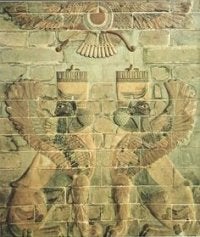Joined Jul 2025
14 Posts | 5+
Ilam, iran
Last edited:
In ancient Iran, twelve months were named after twelve Spenta mainiyu.
One from these months is Mordad. In old times, this month was called Amertat, but after islam its name was changed to Mordad.
Amertat, was the goddess of nature and greenness.

The festival of Amordad
In ancient times, perhaps Achaemenid persia and sassanid eranshahr, people of iran went to deserts and held the Amertat festival and prayed to Amertat make their deserts green. Iran is a country with different biomes. Northern iran is too green. Kurdistan, gilan, mazandaran and khorasan are well-known for their green forests.
Unlike northern iran, centeral iran is too dry. Kavir-e-lut is a vast and hot desert without rain. The Southern iran is next to the Persian gulf and strait of hormuz. This area is too hot, but agriculture and fishing in this area is common.

Except persians and zoroastrians, kurds and gilaks hold festivals for greenness of deserts have Zoroastrian and ancient iranian origins.

Kurds harvest straw berry during a traditional festival. Torch festival, pir shalyar and mehregan festivals of kurdistan have Zoroastrian origins.
What does the name Amertat means?
This name has two parts: The negative "A(non/un)" and "mertat(death)". In persian, this name is translated to "Without death(Bi margi)"..
Sources:
1. The national festivals of iran book(is written in persian)
2. Zorwan: The celander in ancient iran(written in persian)
3. The remaining signs of past centuries by Biruni
One from these months is Mordad. In old times, this month was called Amertat, but after islam its name was changed to Mordad.
Amertat, was the goddess of nature and greenness.

The festival of Amordad
In ancient times, perhaps Achaemenid persia and sassanid eranshahr, people of iran went to deserts and held the Amertat festival and prayed to Amertat make their deserts green. Iran is a country with different biomes. Northern iran is too green. Kurdistan, gilan, mazandaran and khorasan are well-known for their green forests.
Unlike northern iran, centeral iran is too dry. Kavir-e-lut is a vast and hot desert without rain. The Southern iran is next to the Persian gulf and strait of hormuz. This area is too hot, but agriculture and fishing in this area is common.

Except persians and zoroastrians, kurds and gilaks hold festivals for greenness of deserts have Zoroastrian and ancient iranian origins.

Kurds harvest straw berry during a traditional festival. Torch festival, pir shalyar and mehregan festivals of kurdistan have Zoroastrian origins.
What does the name Amertat means?
This name has two parts: The negative "A(non/un)" and "mertat(death)". In persian, this name is translated to "Without death(Bi margi)"..
Sources:
1. The national festivals of iran book(is written in persian)
2. Zorwan: The celander in ancient iran(written in persian)
3. The remaining signs of past centuries by Biruni


